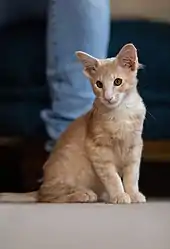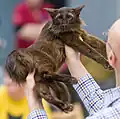Oriental Longhair
The Oriental Longhair is a variety of domestic cat. It is closely related to the Oriental Shorthair. The Oriental Longhair in some registries, such as The International Cat Association (TICA), is a separate breed. In others, such as the Cat Fanciers' Association (CFA), it is a division, along with the short-haired variety, of a merged breed, the Oriental.[1] With no globally recognised naming convention, other cat fanciers may refer to this type as Foreign Longhair, Javanese or Mandarin.[2] It was formerly known as the British Angora before being renamed in 2002 by British cat fanciers in order to avoid confusion with the Turkish Angora.[3]
| Oriental Longhair | |
|---|---|
 Oriental Longhair (solid black). | |
| Other names | British Angora Javanese Foreign Longhair Mandarin |
| Breed standards | |
| CFA | standard |
| FIFe | standard |
| TICA | standard |
| WCF | standard |
| ACF | standard |
| ACFA/CAA | standard |
| Domestic cat (Felis catus) | |
Description
_(2013%253B_cropped_2023).jpg.webp)
Oriental Longhairs feature a long, tubular, Oriental-style body but with a longer silky coat. The range of possible coat colours includes everything from self-coloured (black, blue, chocolate, lilac, cinnamon, caramel, fawn, red, cream and apricot), tortoiseshell, smoke (silver undercoat), shaded or tipped, tabby or white. The eyes are almond shaped. The preferred eye colour for Oriental Longhairs is green; except for the whites, which may have green or blue eyes, or be odd-eyed (two different coloured eyes).[4]
If an Oriental Longhair is bred to an Oriental shorthair or a Siamese, the kittens will all be short-haired.[5] This is because the gene for long hair is recessive. The kittens will, however, be a variant, a carrier of the long-hair gene. If such a "variant" is bred to a cat with long hair, or to another variant, they may produce both short-haired and long-haired kittens. Variants may have a slightly longer coat than Oriental Shorthairs, but this is not always the case.
Behavior

The Oriental Longhair is an active cat that likes to play.[6] If the owner does not have the time to do so, it will often find a toy to play on its own. The breed enjoys jumping and does it well, usually without breaking any objects due to its agility and elegance. Oriental Longhairs are highly intelligent and are ideal companions for people who like their pets to be close to them.[6] They are loyal and most get along well with other cats, especially if they are of the same breed group. Oriental Longhairs are not adapted to a life of living alone and prefer an interactive home.[6]
Orientals, like their cousin breed the Siamese, have loud and expressive voices that are used often.[6] Many Orientals take to leash training quickly if started young. They have been known to open cabinets, doors and even refrigerators. This breed group is often recommended for more experienced cat keepers.
Health
The Oriental Longhair typically lives for around 15 years.[7] Some can suffer from flat-chested kitten syndrome, which is a condition where the cat's chest does not develop properly. This can result in breathing difficulties.[6]
Gallery
 Chocolate adult
Chocolate adult Chocolate smoke adult
Chocolate smoke adult.JPG.webp) Chocolate spotted tabby adult
Chocolate spotted tabby adult.jpg.webp) Red tabby adult
Red tabby adult
See also
- Javanese cat, for the non-traditional coloured Balinese cat
- Oriental Shorthair
- List of cat breeds
References
- "Oriental". Cat Fanciers' Association (CFA). Retrieved 18 August 2023.
- "siam-ori-en - wcf en". 2021-05-31. Retrieved 2023-08-18.
- "Angora (British Angora) renamed Oriental Longhair in 2002". Pets Gallery website. Archived from the original on 19 August 2014. Retrieved 18 August 2014.
- "Oriental Longhair". The International Cat Association. Archived from the original on 18 May 2014. Retrieved 18 August 2014.
- "Oriental Longhair - Oriental Cat Association". www.orientalcatassociation.org. Retrieved 2023-06-23.
- "Oriental Long Hair Cat Breed Information | Purina". www.purina.co.uk. Retrieved 2023-06-23.
- "Oriental Longhair Cat breed information". Your Cat. 2011-07-19. Retrieved 2023-06-23.